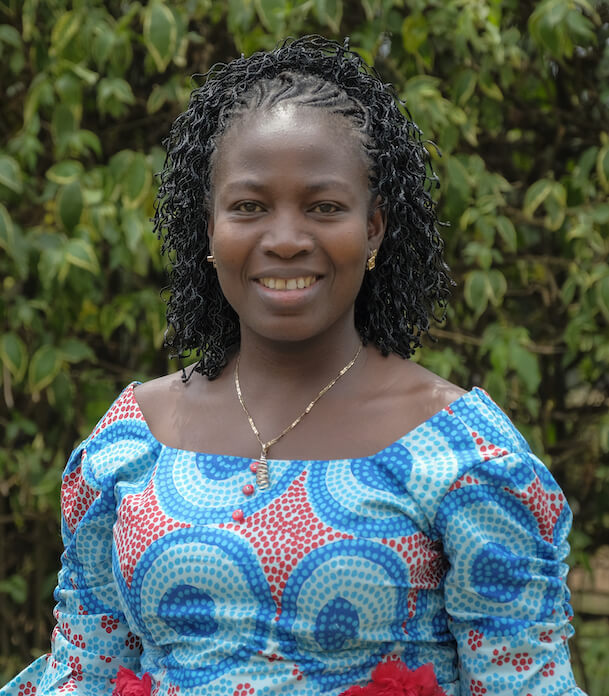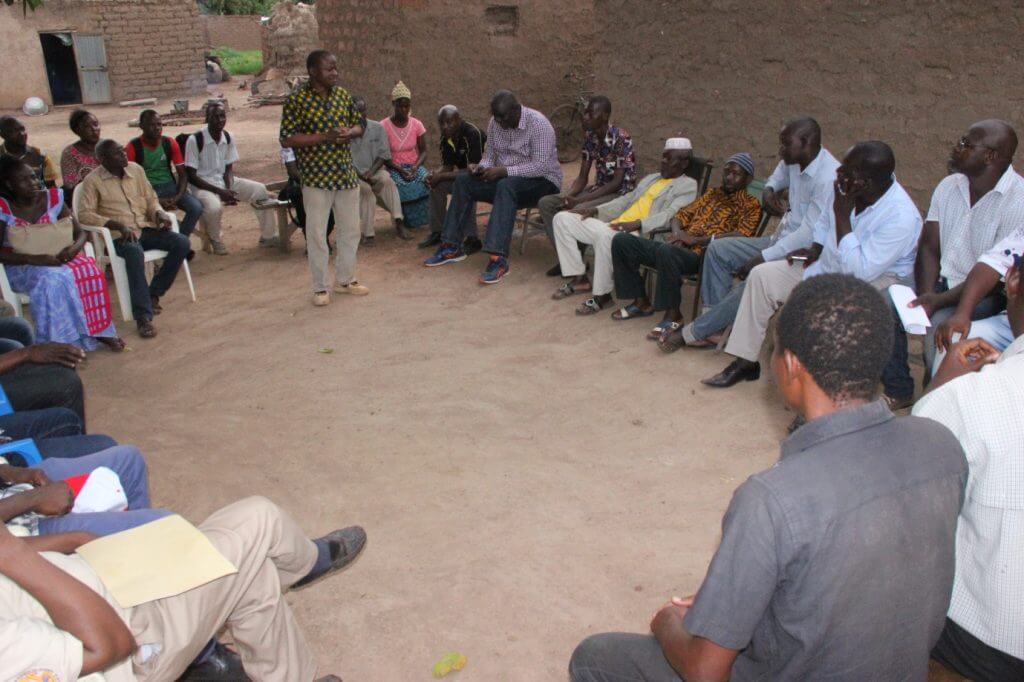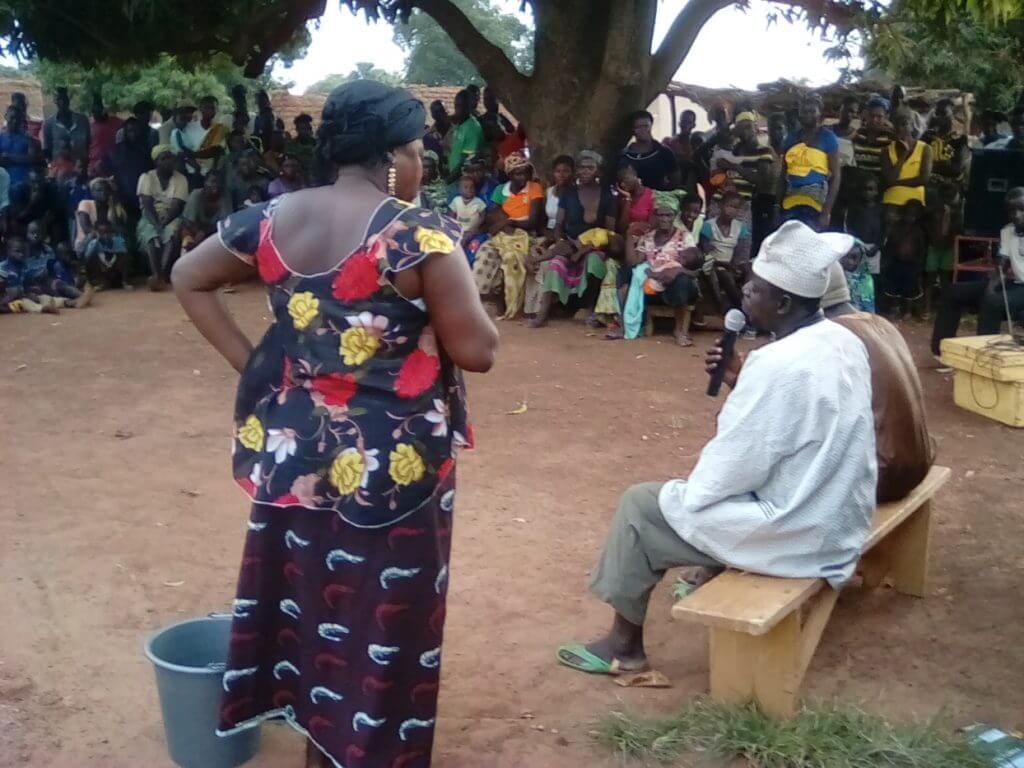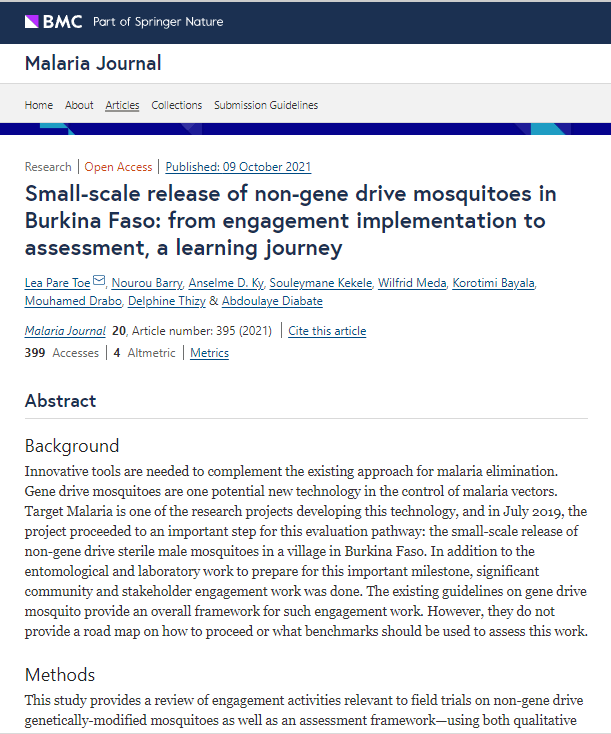Developing a stakeholder engagement roadmap for novel genetic approaches for vector control


In July 2019, Target Malaria, in collaboration with the National Institute of Health Sciences (Institut de Recherche en Sciences de la Santé-IRSS) proceeded with the small-scale release of non gene drive genetically modified sterile male mosquitoes in the village of Bana, Burkina Faso. The release was made possible following authorisation by the competent national legal authorities and the agreement given by the community of Bana for it to take place on their land.
Researchers who conducted community engagement over years prior to the release recently published the paper: “Small-scale release of non gene drive mosquitoes in Burkina Faso: from engagement implementation to assessment, a learning journey”. This documents the engagement activities carried out and offers an opportunity to explore the practical achievements and challenges of stakeholder engagement for responsible research during early phases of a technology evaluation in the field of genetic approaches for malaria vector control.
The release did not aim to impact malaria transmission but was focused on gathering information, building knowledge and developing local skills. It also enabled the project to work closely with affected communities and regulatory authorities and contribute to a continuous dialogue with these stakeholders on genetic approaches to malaria control.

Prior to the release, significant community and stakeholder engagement work was carried out. This allowed local teams to adequately inform affected stakeholders of the research being conducted. The release was also an opportunity for the teams to reflect on their engagement approach, evaluate its strengths and opportunities for improvement.
Although the existing guidelines on gene drive mosquitoes provide an overall framework for such engagement work, they do not provide a road map on how to proceed or what benchmarks should be used to assess this work. To bridge this gap and innovate and learn about engagement processes for responsible research in the field of genetic approaches for vector control, Target Malaria implemented a rigorous internal assessment process of the engagement work carried out before the release. The assessment complemented the formal oversight process conducted by the research ethics committee and regulatory authorities and was used to evaluate whether the release activities could proceed with the appropriate level of agreement from communities.

The paper documenting these activities had two purposes: first, to describe and conduct a critical analysis of the engagement that led up to the small-scale release of non gene drive sterile male mosquitoes in Burkina Faso, and second, to examine the assessment framework put in place to review the process and outcomes of this engagement before proceeding to the release. The study specifically examines engagement and community readiness and shows the importance of the sterile male phase of work to innovate and learn about engagement processes. It analyses how Target Malaria established and implemented an assessment framework of communities’ involvement and acceptability of the proposed research activities, as recommended in international guidance documents.
This process allowed teams to clarify, confirm and deepen understanding on specific topics related to engagement, such as:
- Stakeholder identification and prioritisation – who to engage, how often and how
- Understanding of community dynamics and governance – Understanding the community’s power structures and traditions in order to propose a legitimate engagement approach
- Knowledge building – the importance of knowledge exchange and dialogue to ensure that the research and work carried out by the project are well-understood
- Community decision making process – ensuring that the community’s decision regarding a potential release is both informed and legitimate
- Tailoring engagement to different stakeholders
Moreover, the audits and quantitative studies carried out as part of the assessment framework were successful in exposing limitations of the approach used and allowing teams to learn from their experience.
This paper shows the importance and success of this first phase of work as a learning and capacity-strengthening activity. The stakeholder engagement process, including the assessments, was crucial to build trust and empowerment with directly affected communities and other key stakeholders. Stakeholder engagement assessments demonstrated ways to increase understanding and ensure effective progress with field studies. The lessons learned in the process will be critical for the project’s next steps of engagement with communities, stakeholders and the broader public.
At Target Malaria, our commitment to stakeholder engagement is rooted in ethical principles and a recognition that the affected communities should be involved in the development of public health interventions.

